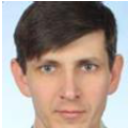
Alexey Yurko
Work place: Kremenchuk Mykhailo Ostrohradskyi National University, Kremenchuk, 39600, Ukraine
E-mail: yurkoalexe@gmail.com
Website: https://orcid.org/0000-0002-8244-2376
Research Interests:
Biography
Alexey Yurko is an Associate Professor of the Department of Computer Engineering and Electronics, Kremenchuk Mykhailo Ostrohradskyi National University, Kremenchuk, Ukraine He is a Candidate of Technical Sciences. Research interests: electronic digital systems, computer modelling of processes and systems, transmission and signal coding. He has nearly 100 scientific papers.
Author Articles
Modified Kalman Filter with Chebyshev Points Based on a Recurrent Neural Network for Automatic Control System Measuring Channels Diagnosing and Parring off Failures
By Serhii Vladov Oleksandr Muzychuk Victoria Vysotska Alexey Yurko Dmytro Uhryn
DOI: https://doi.org/10.5815/ijigsp.2024.05.04, Pub. Date: 8 Oct. 2024
The article is devoted to the modified multidimensional Kalman filter with Chebyshev points development to solve the task of diagnosing and parring off failures in the measurement channels of complex dynamic objects automatic control system, which will provide a more accurate and reliable assessment of system state in the presence of outliers in the data. An implementation of the proposed modified multidimensional Kalman filter with Chebyshev points is proposed in the form of a modified recurrent neural network containing a failure diagnostics layer, a failure parry layer, a filtering and smoothing layer, and a results aggregation layer. This structure of the modified recurrent neural network made it possible to solve the main problems of the method of diagnosing and parring off failures of the measuring channels of complex dynamic objects automatic control system, such as diagnosing failures with an accuracy of 0.99802, fending off failures with an accuracy of 0.99796, and assessing the state of the system with an accuracy of 0.99798. It is proposed to use a modified loss function of a recurrent neural network as a general loss function for diagnostics, fault restoring and system state assessment, which makes it possible to avoid retraining when there are a large number of parameters or insufficient data. It has been experimentally proven that the loss function remains stable on both the training and validation data sets for 1000 training epochs and does not go beyond –2.5 % to +2.5 %, which indicates a low-risk overtraining or undertraining of the model. It has been experimentally confirmed that the use of a modified recurrent neural network in solving the task of diagnosing and parring off failures of the measuring channels of complex dynamic objects automatic control system is appropriate in comparison with a radial basis functions neural network and a multidimensional Kalman filter without a neural network implementation, based on metrics such as the root mean square deviation, mean absolute error, mean absolute percentage error, coefficient of determination for the accuracy of reproducing previous data, and coefficient of determination for the accuracy of predicting future values. For example, the value of the standard deviation of the modified recurrent neural network is 0.00226, which is 1.65 times less than the radial basis function neural network and 2.20 times less than the multidimensional Kalman filter without a neural network implementation.
[...] Read more.Other Articles
Subscribe to receive issue release notifications and newsletters from MECS Press journals